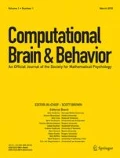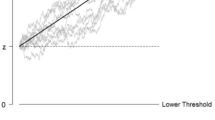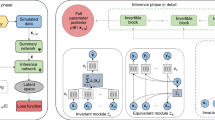Abstract
Previous research has shown that individuals with greater cognitive abilities display a greater speed of higher-order cognitive processing. These results suggest that speeded neural information processing may facilitate evidence accumulation during decision making and memory updating and thus yield advantages in general cognitive abilities. We used a hierarchical Bayesian cognitive modeling approach to test the hypothesis that individual differences in the velocity of evidence accumulation mediate the relationship between neural processing speed and cognitive abilities. We found that a higher neural speed predicted both the velocity of evidence accumulation across behavioral tasks and cognitive ability test scores. However, only a negligible part of the association between neural processing speed and cognitive abilities was mediated by individual differences in the velocity of evidence accumulation. The model demonstrated impressive forecasting abilities by predicting 36% of individual variation in cognitive ability test scores in an entirely new sample solely based on their electrophysiological and behavioral data. Our results suggest that individual differences in neural processing speed might affect a plethora of higher-order cognitive processes, that only in concert explain the large association between neural processing speed and cognitive abilities, instead of the effect being entirely explained by differences in evidence accumulation speeds.








Similar content being viewed by others
Notes
We fitted another variant of the mediation model, in which reaction times were described by a normal distribution instead of a diffusion model distribution to evaluate the benefits of diffusion modeling and the generalizability of our results (for details regarding modeling choices and results, see the online repository). The model predicted the same amount of in-sample variance in ERP latencies and intelligence test scores, but was less accurate in predicting reaction time data (75–84% of explained variance in percentiles of the RT distribution). The out-of-sample prediction of both reaction time data and cognitive ability test scores also deteriorated, with R2s ranging from − 1.79 to − 2.40 for the percentiles of the RT distribution and only 30% of explained variance in cognitive ability test scores. Taken together, these results illustrate the benefits of diffusion modeling and support the notion of a small mediating effect of drift rate, as predictability of cognitive abilities decreased when drift was not included in the model.
References
Baron, R.M., & Kenny, D.A. (1986). The moderator–mediator variable distinction in social psychological research: conceptual, strategic, and statistical considerations. Journal of Personality and Social Psychology, 51(6), 1173.
Barrouillet, P., Bernardin, S., Camos, V. (2004). Time constraints and resource sharing in adults’ working memory spans. Journal of Experimental Psychology: General, 133(1), 83–100. https://doi.org/10.1037/0096-3445.133.1.83.
Basten, U., Hilger, K., Fiebach, C.J. (2015). Where smart brains are different: a quantitative meta-analysis of functional and structural brain imaging studies on intelligence. Intelligence, 51, 10–27. https://doi.org/10.1016/j.intell.2015.04.009.
Bazana, P.G., & Stelmack, R.M. (2002). Intelligence and information processing during an auditory discrimination task with backward masking: an event-related potential analysis. Journal of Personality and Social Psychology, 83 (4), 998–1008.
Bentler, P.M., & Chou, C.-P. (1987). Practical issues in structural modeling. Sociological Methods Research, 16(1), 78–117. https://doi.org/10.1177/0049124187016001004.
Boehm, U., Marsman, M., Matzke, D., Wagenmakers, E.-J. (2018). On the importance of avoiding shortcuts in applying cognitive models to hierarchical data. Behavior Research Methods. https://doi.org/10.3758/s13428-018-1054-3.
Cassidy, S.M., Robertson, I.H., O’Connell, R.G. (2012). Retest reliability of event-related potentials: evidence from a variety of paradigms. Psychophysiology, 49(5), 659–664. https://doi.org/10.1111/j.1469-8986.2011.01349.x.
Conway, A.R., Cowan, N., Bunting, M.F., Therriault, D.J., Minkoff, S.R. (2002). A latent variable analysis of working memory capacity, short-term memory capacity, processing speed, and general fluid intelligence. Intelligence, 30(2), 163–183. https://doi.org/10.1016/S0160-2896(01)00096-4.
Dai, T., & Guo, Y. (2017). Predicting individual brain functional connectivity using a bayesian hierarchical model. NeuroImage, 147, 772–787. https://doi.org/10.1016/j.neuroimage.2016.11.048.
Deary, I. (2008). Why do intelligent people live longer? Nature, 456(7219), 175–176. https://doi.org/10.1038/456175a.
de Hollander, G., Forstmann, B.U., Brown, S.D. (2016). Different ways of linking behavioral and neural data via computational cognitive models. Biological Psychiatry: Cognitive Neuroscience and Neuroimaging, 1 (2), 101–109. https://doi.org/10.1016/j.bpsc.2015.11.004. Retrieved from http://www.sciencedirect.com/science/article/pii/S2451902215000166.
Der, G., Batty, G.D., Deary, I.J. (2009). The association between iq in adolescence and a range of health outcomes at 40 in the 1979 us national longitudinal study of youth. Intelligence, 37(6), 573–580. https://doi.org/10.1016/j.intell.2008.12.002.
Downar, J., Crawley, A.P., Mikulis, D.J., Davis, K.D. (2002). A cortical network sensitive to stimulus salience in a neutral behavioral context across multiple sensory modalities. Journal of Neurophysiology, 87 (1), 615–620. https://doi.org/10.1152/jn.00636.2001.
Engle, R.W., Tuholski, S.W., Laughlin, J.E., Conway, A.R. (1999). Working memory, short-term memory, and general fluid intelligence: a latent-variable approach. Journal of Experimental Psychology: General, 128 (3), 309–331.
Forstmann, B.U., Wagenmakers, E.-J., Eichele, T., Brown, S., Serences, J.T. (2011). Reciprocal relations between cognitive neuroscience and formal cognitive models: opposites attract? Trends in Cognitive Sciences, 15(6), 272–279. https://doi.org/10.1016/j.tics.2011.04.002.
Frischkorn, G.T., & Schubert, A.-L. (2018). Cognitive models in intelligence research: Advantages and recommendations for their application. Journal of Intelligence 6(3), 1–22. https://doi.org/10.3390/jintelligence6030034.
Gelman, A., & Rubin, D.B. (1992). Inference from iterative simulation using multiple sequences. Statistical Science, 7(4), 457–472. https://doi.org/10.1214/ss/1177011136.
Gratton, G., Coles, M.G., Donchin, E. (1983). A new method for off-line removal of ocular artifact. Electroencephalography and Clinical Neurophysiology, 55(4), 468–484. https://doi.org/10.1016/0013-4694(83)90135-9.
Hawkins, G.E., Mittner, M., Boekel, W., Heathcote, A., Forstmann, B.U. (2015). Toward a model-based cognitive neuroscience of mind wandering. Neuroscience, 310, 290–305. https://doi.org/10.1016/j.neuroscience.2015.09.053.
Hick, W.E. (1952). On the rate of gain of information. Quarterly Journal of Experimental Psychology, 4(1), 11–26. https://doi.org/10.1080/17470215208416600.
Hilger, K., Ekman, M., Fiebach, C.J., Basten, U. (2017). Efficient hubs in the intelligent brain: nodal efficiency of hub regions in the salience network is associated with general intelligence. Intelligence, 60(Supplement C), 10–25. https://doi.org/10.1016/j.intell.2016.11.001.
Jäger, A.O., & Süß, H.M. (1997). Berlinger intelligenzstruktur-test form 4. Hogrefe: Göttingen.
Jung, R.E., & Haier, R.J. (2007). The parieto-frontal integration theory (p-fit) of intelligence: converging neuroimaging evidence. Behavioral and Brain Sciences, 30(2), 135–154. https://doi.org/10.1017/S0140525X07001185.
Kass, R.E., & Raftery, A.E. (1995). Bayes factors. Journal of the American Statistical Association, 90(430), 773–795. https://doi.org/10.1080/01621459.1995.10476572.
Kelly, S.P., & O’Connell, R.G. (2013). Internal and external influences on the rate of sensory evidence accumulation in the human brain. Journal of Neuroscience, 33(50), 19434–19441. https://doi.org/10.1523/JNEUROSCI.3355-13.2013.
Kievit, R.A., Davis, S.W., Griffiths, J., Correia, M.M., Cam-CAN, Henson, R.N. (2016). A watershed model of individual differences in fluid intelligence. Neuropsychologia, 91, 186–198. https://doi.org/10.1016/j.neuropsychologia.2016.08.008.
Kovacs, K., & Conway, A.R.A. (2016). Process overlap theory: a unified account of the general factor of intelligence. Psychological Inquiry, 27(3), 151–177. https://doi.org/10.1080/1047840X.2016.1153946.
Kretzschmar, A., Spengler, M., Schubert, A.-L., Steinmayr, R., Ziegler, M. (2018). The relation of personality and intelligence–what can the brunswik symmetry principle tell us?. Journal of Intelligence 6(3), 1–38. https://doi.org/10.3390/jintelligence6030030.
Kyllonen, P.C., & Christal, R.E. (1990). Reasoning ability is (little more than) working-memory capacity?! Intelligence, 14(4), 389–433. https://doi.org/10.1016/S0160-2896(05)80012-1.
Kyllonen, P.C., & Zu, J. (2016). Use of response time for measuring cognitive ability. Journal of Intelligence 4(4), 1–29. https://doi.org/10.3390/jintelligence4040014.
Lee, M.D. (2011). How cognitive modeling can benefit from hierarchical bayesian models. Journal of Mathematical Psychology, 55(1), 1–7. https://doi.org/10.1016/j.jmp.2010.08.013.
Lee, M.D., & Wagenmakers, E.-J. (2014). Bayesian cognitive modeling: a practical course. Cambridge: Cambridge University Press.
Lee, S.Y., & Song, X.Y. (2004). Evaluation of the bayesian and maximum likelihood approaches in analyzing structural equation models with small sample sizes. Multivariate Behavioral Research, 39(4), 653–686. PMID: 26745462 https://doi.org/10.1207/s15327906mbr3904_4.
Levy, R., & Choi, J. (2013). Bayesian structural equation modeling. In Hancock, G.R., & Mueller, R.O. (Eds.) Structural equation modeling: a second course (pp. 563–623). Information Age: Charlotte and NC.
Ly, A., Boehm, U., Heathcote, A., Turner, B.M., Forstmann, B., Marsman, M., Matzke, D. (2017). A flexible and efficient hierarchical bayesian approach to the exploration of individual differences in cognitive-model-based neuroscience. In Computational models of brain and behavior (pp. 467–479): Wiley-Blackwell. https://doi.org/10.1002/9781119159193.ch34.
Marsh, H.W., Hau, K.T., Balla, J.R., Grayson, D. (1998). Is more ever too much? the number of indicators per factor in confirmatory factor analysis. Multivariate Behavioral Research, 33(2), 181–220. https://doi.org/10.1207/s15327906mbr3302_1.
McGarry-Roberts, P.A., Stelmack, R.M., Campbell, K.B. (1992). Intelligence, reaction time, and event-related potentials. Intelligence, 16(3–4), 289–313. https://doi.org/10.1016/0160-2896(92)90011-F.
Mejia, A.F., Nebel, M.B., Barber, A.D., Choe, A.S., Pekar, J.J., Caffo, B.S., Lindquist, M.A. (2018). Improved estimation of subject-level functional connectivity using full and partial correlation with empirical bayes shrinkage. NeuroImage, 172, 478–491. https://doi.org/10.1016/j.neuroimage.2018.01.029.
Menon, V., & Uddin, L.Q. (2010). Saliency, switching, attention and control: a network model of insula function. Brain Structure and Function, 214(5), 655–667. https://doi.org/10.1007/s00429-010-0262-0.
Merkle, E., & Rosseel, Y. (2018). blavaan: Bayesian structural equation models via parameter expansion. Journal of Statistical Software, 85(4), 1–30. https://doi.org/10.18637/jss.v085.i04.
Mittner, M., Boekel, W., Tucker, A.M., Turner, B.M., Heathcote, A., Forstmann, B.U. (2014). When the brain takes a break: a model-based analysis of mind wandering. Journal of Neuroscience, 34(49), 16286–16295. https://doi.org/10.1523/JNEUROSCI.2062-14.2014.
Neubauer, A.C., & Fink, A. (2009). Intelligence and neural efficiency. Neuroscience Biobehavioral Reviews, 33(7), 1004–1023. https://doi.org/10.1016/j.neubiorev.2009.04.001.
Nikolaev, B., & McGee, J.J. (2016). Relative verbal intelligence and happiness. Intelligence, 59, 1–7. https://doi.org/10.1016/j.intell.2016.09.002.
Nunez, M.D., Srinivasan, R., Vandekerckhove, J. (2015). Individual differences in attention influence perceptual decision making. Frontiers in Psychology, 8, 18. https://doi.org/10.3389/fpsyg.2015.00018.
Nunez, M.D., Vandekerckhove, J., Srinivasan, R. (2017). How attention influences perceptual decision making: single-trial eeg correlates of drift-diffusion model parameters. Journal of Mathematical Psychology, 76, 117–130. https://doi.org/10.1016/j.jmp.2016.03.003.
Oberauer, K., Lewandowsky, S., Farrell, S., Jarrold, C., Greaves, M. (2012). Modeling working memory: an interference model of complex span. Psychonomic Bulletin Review, 19(5), 779–819. https://doi.org/10.3758/s13423-012-0272-4.
O’Connell, R.G., Dockree, P.M., Kelly, S.P. (2012). A supramodal accumulation-to-bound signal that determines perceptual decisions in humans. Nature Neuroscience, 15(12), 1729–1735. https://doi.org/10.1038/nn.3248.
Palmeri, T.J., Love, B.C., Turner, B.M. (2017). Model-based cognitive neuroscience. Journal of Mathematical Psychology. https://doi.org/10.1016/j.jmp.2016.10.010.
Penke, L., Maniega, S.M., Bastin, M.E., Valdes Hernandez, M.C., Murray, C., Royle, N.A., Deary, I.J. (2012). Brain white matter tract integrity as a neural foundation for general intelligence. Molecular Psychiatry, 17(10), 1026–1030. https://doi.org/10.1038/mp.2012.66.
Pesta, B.J., McDaniel, M.A., Bertsch, S. (2010). Toward an index of well-being for the fifty u.s. states. Intelligence, 38(1), 160–168. https://doi.org/10.1016/j.intell.2009.09.006.
Plummer, M. (2003). Jags: a program for analysis of bayesian graphical models using gibbs sampling.
Polich, J. (2007). Updating p300: an integrative theory of p3a and p3b. Clinical Neurophysiology, 118(10), 2128–2148. https://doi.org/10.1016/j.clinph.2007.04.019.
Ratcliff, R. (1978). A theory of memory retrieval. Psychological Review, 85(2), 59–108.
Ratcliff, R., & McKoon, G. (2008). The diffusion decision model: theory and data for two-choice decision tasks. Neural Computation, 20(4), 873–922. https://doi.org/10.1162/neco.2008.12-06-420.
Ratcliff, R., Philiastides, M.G., Sajda, P. (2009). Quality of evidence for perceptual decision making is indexed by trial-to-trial variability of the eeg. Proceedings of the National Academy of Sciences, 106(16), 6539–6544. https://doi.org/10.1073/pnas.0812589106.
Ratcliff, R., Sederberg, P.B., Smith, T.A., Childers, R. (2016). A single trial analysis of eeg in recognition memory: tracking the neural correlates of memory strength. Neuropsychologia, 93(Pt A), 128–141. https://doi.org/10.1016/j.neuropsychologia.2016.09.026.
Ratcliff, R., Thapar, A., McKoon, G. (2010). Individual differences, aging, and iq in two-choice tasks. Cognitive Psychology, 60(3), 127–157. https://doi.org/10.1016/j.cogpsych.2009.09.001.
Ratcliff, R., Thapar, A., McKoon, G. (2011). Effects of aging and iq on item and associative memory. Journal of Experimental Psychology: General, 140(3), 464–487. https://doi.org/10.1037/a0023810.
Raven, J.C., Court, J.H., Raven, J. (1994). Manual for raven’s progressive matrices and mill hill vocabulary scales advanced progressive matrices. Oxford: Oxford University Press.
Ross, S.M. (2014). Introduction to probability models. New York: Academic Press.
Schmidt, F.L., & Hunter, J. (2004). General mental ability in the world of work: occupational attainment and job performance. In Work and organisational psychology: Research methodology; assessment and selection; organisational change and development; human resource and performance management; emerging trends: Innovation/globalisation/technology. Schmidt, Frank L., Tippie College of Business, University of Iowa, Iowa City, IA, US, 52242 (pp. 35–58): Sage Publications, Inc.
Schmiedek, F., Oberauer, K., Wilhelm, O., Suss, H.-M., Wittmann, W.W. (2007). Individual differences in components of reaction time distributions and their relations to working memory and intelligence. Journal of Experimental Psychology: General, 136(3), 414–429. https://doi.org/10.1037/0096-3445.136.3.414.
Schmitz, F., & Wilhelm, O. (2016). Modeling mental speed: decomposing response time distributions in elementary cognitive tasks and correlations with working memory capacity and fluid intelligence. Journal of Intelligence 4(13), 1–23. https://doi.org/10.3390/jintelligence4040013.
Schubert, A.-L., Frischkorn, G.T., Hagemann, D., Voss, A. (2016). Trait characteristics of diffusion model parameters. Journal of Intelligence 4(7), 1–22. https://doi.org/10.3390/jintelligence4030007.
Schubert, A.-L., Hagemann, D., Frischkorn, G.T. (2017). Is general intelligence little more than the speed of higher-order processing? Journal of Experimental Psychology: General, 146(10), 1498–1512. https://doi.org/10.1037/xge0000325.
Schubert, A.-L., Hagemann, D., Frischkorn, G.T., Herpertz, S.C. (2018). Faster, but not smarter: An experimental analysis of the relationship between mental speed and mental abilities. Intelligence, 71, 66–75. https://doi.org/10.1016/j.intell.2018.10.005.
Schubert, A.-L., Hagemann, D., Voss, A., Schankin, A., Bergmann, K. (2015). Decomposing the relationship between mental speed and mental abilities. Intelligence, 51, 28–46. https://doi.org/10.1016/j.intell.2015.05.002.
Sebastian, A., Forstmann, B.U., Matzke, D. (2018). Towards a model-based cognitive neuroscience of stopping - a neuroimaging perspective. Neuroscience Biobehavioral Reviews, 90, 130–136. https://doi.org/10.1016/j.neubiorev.2018.04.011.
Seeley, W.W., Menon, V., Schatzberg, A.F., Keller, J., Glover, G.H., Kenna, H., Greicius, M.D. (2007). Dissociable intrinsic connectivity networks for salience processing and executive control. Journal of Neuroscience, 27(9), 2349–2356. https://doi.org/10.1523/JNEUROSCI.5587-06.2007.
Sheppard, L.D., & Vernon, P.A. (2008). Intelligence and speed of information-processing: a review of 50 years of research. Personality and Individual Differences, 44(3), 535–551. https://doi.org/10.1016/j.paid.2007.09.015.
Shiffrin, R.M., Lee, M.D., Kim, W., Wagenmakers, E.-J. (2008). A survey of model evaluation approaches with a tutorial on hierarchical bayesian methods. Cognitive Science, 32(8), 1248–1284. https://doi.org/10.1080/03640210802414826.
Shou, H., Eloyan, A., Nebel, M. B., Mejia, A., Pekar, J.J., Mostofsky, S., Crainiceanu, C.M. (2014). Shrinkage prediction of seed-voxel brain connectivity using resting state fmri. NeuroImage, 102, 938–944. https://doi.org/10.1016/j.neuroimage.2014.05.043.
Soltani, M., & Knight, R.T. (2000). Neural origins of the p300. Critical Reviews in Neurobiology, 14(3-4), 199–224.
Spiegelhalter, D.J., Best, N.G., Carlin, B.P., van der Linde, A. (2014). The deviance information criterion: 12 years on. Journal of the Royal Statistical Society: Series B (Statistical Methodology), 76(3), 485–493. https://doi.org/10.1111/rssb.12062.
Stone, M. (1960). Models for choice-reaction time. Psychometrika, 25(3), 251–260.
Troche, S.J., Houlihan, M.E., Stelmack, R.M., Rammsayer, T.H. (2009). Mental ability, p300, and mismatch negativity: analysis of frequency and duration discrimination. Intelligence, 37(4), 365–373. https://doi.org/10.1016/j.intell.2009.03.002.
Troche, S.J., Indermühle, R., Leuthold, H., Rammsayer, T.H. (2015). Intelligence and the psychological refractory period: a lateralized readiness potential study. Intelligence, 53, 138–144. https://doi.org/10.1016/j.intell.2015.10.003.
Turner, B.M., Forstmann, B.U., Love, B.C., Palmeri, T.J., van Maanen, L. (2017). Approaches to analysis in model-based cognitive neuroscience. Journal of Mathematical Psychology. https://doi.org/10.1016/j.jmp.2016.01.001.
Turner, B.M., Rodriguez, C.A., Liu, Q., Molloy, M.F., Hoogendijk, M., McClure, S.M. (2018). On the neural and mechanistic bases of self-control. Cerebral cortex. https://doi.org/10.1093/cercor/bhx355.
Turner, B.M., Wang, T., Merkle, E.C. (2017). Factor analysis linking functions for simultaneously modeling neural and behavioral data. NeuroImage, 153, 28–48. https://doi.org/10.1016/j.neuroimage.2017.03.044 Retrieved from http://www.sciencedirect.com/science/article/pii/S1053811917302525.
Unsworth, N., Fukuda, K., Awh, E., Vogel, E.K. (2014). Working memory and fluid intelligence: capacity, attention control, and secondary memory retrieval. Cognitive Psychology, 71, 1–26. https://doi.org/10.1016/j.cogpsych.2014.01.003.
Vandekerckhove, J. (2014). A cognitive latent variable model for the simultaneous analysis of behavioral and personality data. Journal of Mathematical Psychology, 60, 58–71. https://doi.org/10.1016/j.jmp.2014.06.004.
Vandekerckhove, J., Tuerlinckx, F., Lee, M.D. (2011). Hierarchical diffusion models for two-choice response times. Psychological Methods, 16(1), 44–62. https://doi.org/10.1037/a0021765.
van der Maas, H.L.J., Molenaar, D., Maris, G., Kievit, R.A., Borsboom, D. (2011). Cognitive psychology meets psychometric theory: On the relation between process models for decision making and latent variable models for individual differences. Psychological Review, 118(2), 339–356.
van Ravenzwaaij, D., Brown, S., Wagenmakers, E.-J. (2011). An integrated perspective on the relation between response speed and intelligence. Cognition, 119(3), 381–393. https://doi.org/10.1016/j.cognition.2011.02.002.
van Ravenzwaaij, D., Provost, A., Brown, S.D. (2017). A confirmatory approach for integrating neural and behavioral data into a single model. Journal of Mathematical Psychology, 76, 131–141. https://doi.org/10.1016/j.jmp.2016.04.005.
Voss, A., Rothermund, K., Voss, J. (2004). Interpreting the parameters of the diffusion model: an empirical validation. Memory Cognition, 32(7), 1206–1220.
Wabersich, D., & Vandekerckhove, J. (2014). Extending jags: a tutorial on adding custom distributions to jags (with a diffusion model example). Behavior Research Methods, 46(1), 15–28. https://doi.org/10.3758/s13428-013-0369-3.
Westland, J.C. (2010). Lower bounds on sample size in structural equation modeling. Electronic Commerce Research and Applications, 9(6), 476–487. https://doi.org/10.1016/j.elerap.2010.07.003.
Wongupparaj, P., Kumari, V., Morris, R.G. (2015). The relation between a multicomponent working memory and intelligence: the roles of central executive and short-term storage functions. Intelligence, 53(Supplement C), 166–180. https://doi.org/10.1016/j.intell.2015.10.007.
Yap, M.J., Balota, D.A., Sibley, D.E., Ratcliff, R. (2012). Individual differences in visual word recognition: insights from the english lexicon project. Journal of Experimental Psychology: Human Perception and Performance, 38(1), 53–79. https://doi.org/10.1037/a0024177.
Acknowledgments
The authors thank Gidon T. Frischkorn, Ramesh Srinivasan, and members of the Human Neuroscience Laboratory for their constructive criticism on work related to this manuscript.
Funding
This work was supported by the National Science Foundation [No. 1658303] and the G.A.-Lienert-Foundation.
Author information
Authors and Affiliations
Corresponding author
Additional information
Publisher’s Note
Springer Nature remains neutral with regard to jurisdictional claims in published maps and institutional affiliations.
Rights and permissions
About this article
Cite this article
Schubert, AL., Nunez, M.D., Hagemann, D. et al. Individual Differences in Cortical Processing Speed Predict Cognitive Abilities: a Model-Based Cognitive Neuroscience Account. Comput Brain Behav 2, 64–84 (2019). https://doi.org/10.1007/s42113-018-0021-5
Published:
Issue Date:
DOI: https://doi.org/10.1007/s42113-018-0021-5




